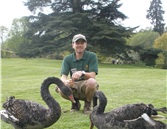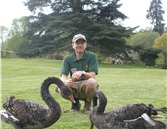
Churchill in the News
Black Swans Return

May 27, 2009
“All the black swans are mating, not only the father and mother, but both brothers and both sisters have paired off. The Ptolemys always did this and Cleopatra was the result. At any rate I have not thought it my duty to interfere.”
-WSC to his wife, Chartwell, 21 January 1935
WESTERHAM, KENT, MAY 26TH- Seventy-five years ago Lady Diana Cooper surveyed Chartwell’s birds: “five foolish geese, five furious black swans, two ruddy sheldrakes, two white swans-Mr. Juno and Mrs. Jupiter, so called because they got the sexes wrong to begin with, two Canadian geese (‘Lord and Lady Beaverbrook’) and some miscellaneous ducks.”
Chartwell’s black swans have been looked after as zealously as the apes on Gibraltar (Finest Hour 125:6), but over the years marauding foxes and mink reduced the population, which reached zero last year. Happily last winter, Chartwell head gardener Giles Palmer installed a new floating “swan island” to provide natural protection, and two new black swans (Cygnus atratus) are now cruising the ponds designed by Sir Winston himself.
Mr. Palmer told Kent News (www.kentnews.co.uk): “I have seen the swans on their island once or twice but am confident that they will see just what they are missing out on as soon as the foliage on the island grows up. For now, I’m simply thrilled that the swans are settling on so well and getting to know the gardens. They’re getting so brave now that they ventured all the way to the kitchen garden recently.” The floating island has allowed gardeners to remove ugly mesh screening set up against predators, returning the lakes to their appearance in Churchill’s time. (We hope they’re right about this.)
The first black swans were a gift from Sir Phillip Sassoon in 1927. The population was topped up by gifts from the government of Western Australia, where the black swan is a state symbol. C. atratus is native also to Tasmania and has been introduced to New Zealand. It is the world’s only black swan, though its flight feathers, invisible at rest, are white. Giles Palmer hopes the pair will soon breed and begin a new generation.

2024 International Churchill Conference
Churchill was devoted to his swans and regularly conversed with them in “swan talk,” in which he claimed proficiency. But a former bodyguard, Ronald Golding, wrote in Finest Hour 34 that this was one of WSC’s little myths, because the swans would cry out to anyone who approached within a certain distance:
“It was some time after this discovery that I was walking down to the lake with Mr. Churchill. I was a little in front, and watched carefully for the critical spot. I then called out in ‘swan-talk’ and the birds dutifully replied. Mr. Churchill stopped dead. I turned round and he looked me full in the eye for a moment or two. Then the faintest suspicion of a smile appeared and he walked on in silence. No comment was ever made that this secret was shared.”
© Photo courtesy of the National Trust
GETTING TO CHARTWELL
Chartwell is open Wednesdays through Sundays from March through 1 November from 11am to 4pm, and on Tuesdays in July and August. Local telephone: (01732) 863087. Periodically we like to remind readers of how to get there from London.
By car: the drive nowadays not something for the faint-hearted or traffic-challenged, or North Americans unfamiliar with righthand-drive. Chartwell is two miles south of Westerham on the A25, accessed by M25 junctions 5 or 6. Drive to the town centre and take the B2026 a few miles to the car park (on left).
By rail and bus: Sevenoaks station 6 1/2 miles; Oxted station 5 1/2 miles; Metrobus 246 from Bromley station to Edenbridge passes the gates.
Some recommend Charing Cross Station to Sevenoaks (four fast rains per hour). The National Trust’s Chartwell Explorer coach takes visitors from Sevenoaks to Chartwell for £3, which provides unlimited bus travel to any local Trust property and a pot of tea at Chartwell. You can also get a combined ticket from London, which includes train and coach, for £13, or £8.50 for Trust members. Details at (08457 696996).
Others suggest Victoria Station (fewer trains, but some marked “to East Grinstead and calling at Oxted”). Though only a mile closer than Sevenoaks, Oxted is less congested, making for a lower taxi fare. If you arrive at Oxted, arrange to have the cabbie pick you up for your return from Chartwell, so you don’t get stranded-although there are worse places to be stranded than Westerham, with its famous King’s Arms. (Factoid: the Nemon statue of Churchill on the village green was a gift from the people of Yugoslavia.)
Subscribe
WANT MORE?
Get the Churchill Bulletin delivered to your inbox once a month.


